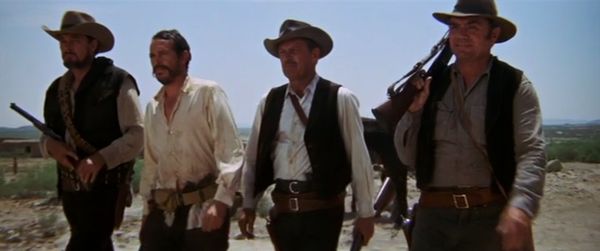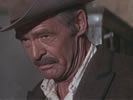Eye For Film >> Movies >> The Wild Bunch (1969) Film Review
The Wild Bunch
Reviewed by: Jeff Robson

It's impossible to overstate how influential Bloody Sam’s 1969 classic, undoubtedly his finest film, has been over the years. No Western produced since has been able to ignore its prevailing themes, its distinctive setting – or its justly famous and still controversial climax. Even more so than Sergio Leone's, his work (and this film in particular) took a dramatically staid and morally predictable genre to extremes, setting a new benchmark for the portrayal of on-screen violence in the process.
In many ways that’s been detrimental – I’m personally tired of seeing Westerns (and action movies in general) that think all you need for a great final scene is to let the second unit loose on a slo-mo squibfest. The remake of 3:10 To Yuma was a particularly bad example, but there are many others who forget that what makes the final scene of The Wild Bunch so effective is that it comes at the end of a heartfelt, sensitive and moving character study of men out of their time and doomed by both their character and calling to meet a violent and tragic end.

It’s undeniably a gripping and visceral set piece (watching it again recently I was amazed to note that it lasts nearly five minutes; in my memory it retained the shocking immediacy of a blow to the face) and there are many others throughout the film, any one of which a modern action director would sell his soul to be able to pull off. But The Wild Bunch is about much more than that.
In many ways Peckinpah was the ideal man to make a film that simultaneously told the story of the West and the Western. He began as a scriptwriter on Fifties TV shows like Gunsmoke and Have Gun Will Travel, which many felt would signal the end of the big-screen Western. But in the 1960s he managed to get behind the camera just as the genre began its last hurrah. One of his early successes was Ride The High Country, a small-scale masterpiece whose story of ageing, morally compromised gunhands predates the Wild Bunch, but whose cinematography and editing has a much more comforting, old-school feel to it.
But he wanted to try more ambitious projects, and this brought him into conflict with the studios, unwilling to give too much freedom to a man with an undoubted genius for excess in both work and play. The troubled shoot of the cavalry Western Major Dundee produced a much-mutilated near-classic that died a death at the box office and for a few years Peckinpah thrashed around within the system, until Warner Bros and producer Phil Feldman gave him a free hand to film a script by Sickner and Green – according to some accounts, to beat 20th Century Fox’s Butch Cassidy And The Sundance Kid into the cinemas.
Though The Wild Bunch shares similar themes (and a slo-mo shootout) with George Roy Hill’s entertaining blockbuster it’s still hard to think of two Westerns more different. From the opening shot of a sun-baked town on the Tex-Mex border, where a group of children are watching an army of ants devour a scorpion alive, we are clearly in much darker, dirtier territory than Newman and Redford are riding. As the children play, a squadron of US cavalrymen ride by. But they are in fact outlaws, led by the legendary Pike Bishop (Holden), in town to rob the payroll from a railroad company’s offices. A tip-off has ensured that a posse of bounty hunters, hired by the railroad and led by Deke Thornton (Ryan), one of Pike’s old gang members, is lying in wait and a gunfight breaks out (almost the equal of the climax for its heart-stopping, perfectly choreographed savagery) in which a crowd of temperance marchers is caught up. Half of Pike’s gang are killed; the rest flee into Mexico to lick their wounds.
The raid convinces Pike that “we need to start thinkin’ beyond our guns”. As he confides to his loyal lieutenant Dutch (Borgnine) it is becoming increasingly hard to hold the gang together. The Gorch brothers (Oates and Johnson) constantly question his leadership and ridicule Sykes (O’Brien), Pike’s old mentor now reduced to the role of cook and horseholder. And the young Mexican Angel (Sanchez - whatever happened to him?) has his own, distinctly political, reasons for riding with the gringos. But Providence appears, in the shape of General Mapache (Fernandez), who has taken advantage of the chaos of revolutionary Mexico to become leader of a force of government troops, pursuing a policy of intimidation and legalised plunder throughout the border country. He has bigger ambitions and, egged on by a trio of German military observers keen to bolster their power base as a world war looms, hires the Bunch to rob a US Army munitions train.
The raid is interrupted by Thornton’s posse but the gang make it back to Mexico with the goods (rounding off the film’s triptych of peerless action set pieces). Angel asks for a case of rifles to help his village defend themselves against the ‘government locusts’ and Pike, disgusted by the all-too-visible effects of Mapache’s reign of terror, agrees and pretends the case was lost in the pursuit.
Mapache remains suspicious, mollified by the unexpected bonus of a machine-gun. But the uneasy truce is shattered when he is informed of Angel’s ruse. He captures and tortures him, and Pike and the gang realise that if their code of honour means anything they have to rescue him, even if it means taking on Mapache’s army ...
The scene where the four men tool up and slowly walk to their destiny, as Jerry Fielding’s dissonant martial score reaches a crescendo, is justly famous, but really this is a film entirely composed of such peerless cinematic moments. Its final image of Pike sums up Peckinpah’s rage against the industrialised, politicised world that has ground down and destroyed these men – flawed and brutal men, indeed, but living their lives by basic values like honour and friendship.
You could write a book (and many people have) about the film’s relationship to the Vietnam War and the civil unrest of late Sixties America – the aftermath of the bank raid is eerily similar to the still photographs of the Kent State University shootings, the year after the film’s release. But it’s a great Western as well as an outstanding political document. Lucien Ballard’s cinematography conjures up equally vividly the sweat-stained aridness of the Mexican desert and (in the flashback scenes of Pike and Thornton’s time together) the wine-dark richness of the old-fashioned oater. Louis Lombardo’s editing set a new benchmark for action scenes, and indeed the whole behind-the camera crew are exemplary. And the performances are beyond praise, Holden in particular capping a magnificent career with a study rich in pathos and humanity, making a man who is in many ways a monster believable and sympathetic.
In fact, the only reason I’ve lopped half a star off is because of the film’s treatment of women. No female character has more than a line or two of dialogue and apart from the dried-up old sticks on the temperance march they’re all prostitutes who, Peckinpah clearly believes, get what’s coming to them. You don’t have to be Mr PC to find that distasteful – and a dramatic flaw to boot. Peckinpah showed elsewhere (particularly in Major Dundee) that he could create three-dimensional female characters.
But that’s the only flaw. The Wild Bunch was a revolutionary film, in every sense of the word. And thankfully it didn’t mark the death of the Western. Great ones continued to be made (including Peckinpah’s last masterpiece, Pat Garret And Billy The Kid) and one could argue that it was an inspiration to anyone with the remotest interest in the genre. It’s certainly hard to imagine Deadwood, The Assassination Of Jesse James... or even There Will Be Blood existing without it. For that, and for creating not just one of the finest Westerns but one of the finest films ever made, I hope Sam’s resting in peace.
Reviewed on: 18 Mar 2009

















